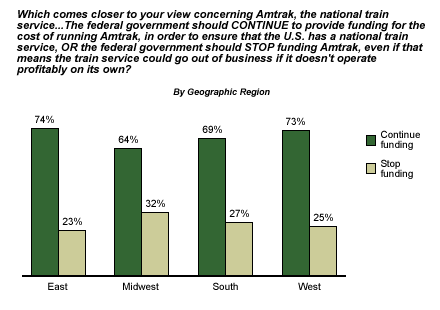An emergency loan from the federal government will keep Amtrak trains running over the July 4 weekend, but the long-term future of the nation's passenger railroad system is still murky. The current financial crisis has created political debate concerning the railroad's dependence on federal funding. Democrats, citing the need for quality public transportation, believe a shutdown of Amtrak and the commuter railroads would result in increased traffic congestion and air pollution. Some Senate Republicans, however, say that the railway's dependence on federal funding places an undue burden on taxpayers.
A CNN/USA Today/Gallup poll conducted in late June* shows that a majority of the public (70%) believes the federal government should continue to provide funding for the cost of running Amtrak. Less than a third (27%) believe the government should stop funding Amtrak. These findings are essentially identical to the first time Gallup asked about the issue in 1997, when 69% of the public believed that the government should continue funding Amtrak, and 26% believed the government should stop funding. Apparently the uncertainty about the safety of airline travel since the Sept. 11 terrorist attacks has had little impact on the perceived importance of train travel in the eyes of the American public.
Public opinion findings reflect the political nature of the issue. While a majority of Republicans -- 63% -- say they think the government should continue to fund Amtrak, that response is far more common among Democrats (81%).
Necessity of train use also plays a part in public opinion on this issue, as evidenced in regional breakdowns of the data. Amtrak's uncertain future not only puts the travel habits of 60,000 daily customers at stake, but also those of hundreds of thousands of commuters who ride state-operated commuter train lines that use switches and tracks that the company owns. Residents of the Eastern and Western portions of the United States, where most of the country's major population centers are located, are the most likely to say federal funding of Amtrak should continue. Residents of the Midwest -- who are probably the least likely to use Amtrak or commuter trains -- are the least likely to say that federal funding of Amtrak should continue, though even their percentage approaches two-thirds (64%).

Similarly, income correlates with the data on this issue. Those with higher incomes are less likely to use public transportation, and therefore may not prioritize its continued operation. Among those making $75,000 or more in yearly income, 62% say they want funding of Amtrak to continue. This is significantly fewer than the 73% of Americans making less than $20,000 who want Amtrak's federal funding to remain in place.
*Results are based on telephone interviews with 1,020 national adults, aged 18 and older, conducted June 21-23, 2002. For results based on the total sample of national adults, one can say with 95% confidence that the maximum margin of sampling error is ±3%.
